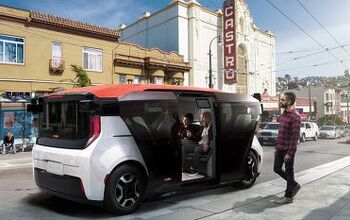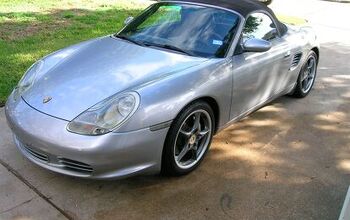Japanese Auto Industry: We're Outta Here

Again and again, Japanese automakers had been warning that they cannot stomach the strong yen, and that it will eventually cost jobs. Today, the yen stood at 76.6 to the dollar, and Japanese carmakers are packing.
Mitsubishi originally wanted to sharply increase Japanese production to make up for lost volume due to the tsunami. The company now “suddenly halved its plan to hire about 800 temporary workers by the end of September, as the yen’s appreciation has been eating into the profitability of its exports to Europe,” says The Nikkei [sub]. Mitsubishi’s President Osamu Masuko told reporters in a press conference today:
“We are fighting to adjust ourselves to the currency’s levels. But these efforts sometimes get wiped out in a single day. Don’t you think there is a growing sense of futility?”
Mitsubishi tried to slash costs as much as possible by becoming leaner and by buying parts abroad. “But the room for reducing costs further is getting smaller,” said Masuko.
A few weeks ago, Nissan’s CEO Carlos Ghosn had warned that a Yen that is not going back to “normal” “will provoke a rethinking of our industrial strategy.”
Some of this rethinking became effective today.
As expected, Nissan announced today at the governor’s palace in Rio de Janeiro that it will plunk down 2.6 billion Brazilian reais ($1.5 billion) for a new plant in Resende, near the ports of Itaguai and Rio de Janeiro.. When completed 2014, the plant is expected to crank out 200,000 units per year.
Nissan plans to introduce 10 new models to Brazil before 2016.
With only approximately 25 percent of its worldwide capacity in Japan, Nissan should be the least affected of Japan’s majors.
“Just as Nissan has demonstrated in China, Russia and India, we are investing in the regions with the most potential for growth,” said Carlos Ghosn. And that’s not Japan.

Bertel Schmitt comes back to journalism after taking a 35 year break in advertising and marketing. He ran and owned advertising agencies in Duesseldorf, Germany, and New York City. Volkswagen A.G. was Bertel's most important corporate account. Schmitt's advertising and marketing career touched many corners of the industry with a special focus on automotive products and services. Since 2004, he lives in Japan and China with his wife <a href="http://www.tomokoandbertel.com"> Tomoko </a>. Bertel Schmitt is a founding board member of the <a href="http://www.offshoresuperseries.com"> Offshore Super Series </a>, an American offshore powerboat racing organization. He is co-owner of the racing team Typhoon.
More by Bertel Schmitt
Latest Car Reviews
Read moreLatest Product Reviews
Read moreRecent Comments
- HotRod Not me personally, but yes - lower prices will dramatically increase the EV's appeal.
- Slavuta "the price isn’t terrible by current EV standards, starting at $47,200"Not terrible for a new Toyota model. But for a Vietnamese no-name, this is terrible.
- Slavuta This is catch22 for me. I would take RAV4 for the powertrain alone. And I wouldn't take it for the same thing. Engines have history of issues and transmission shifts like glass. So, the advantage over hard-working 1.5 is lost.My answer is simple - CX5. This is Japan built, excellent car which has only one shortage - the trunk space.
- Slavuta "Toyota engineers have told us that they intentionally build their powertrains with longevity in mind"Engine is exactly the area where Toyota 4cyl engines had big issues even recently. There was no longevity of any kind. They didn't break, they just consumed so much oil that it was like fueling gasoline and feeding oil every time
- Wjtinfwb Very fortunate so far; the fleet ranges from 2002 to 2023, the most expensive car to maintain we have is our 2020 Acura MDX. One significant issue was taken care of under warranty, otherwise, 6 oil changes at the Acura dealer at $89.95 for full-synthetic and a new set of Michelin Defenders and 4-wheel alignment for 1300. No complaints. a '16 Subaru Crosstrek and '16 Focus ST have each required a new battery, the Ford's was covered under warranty, Subaru's was just under $200. 2 sets of tires on the Focus, 1 set on the Subie. That's it. The Focus has 80k on it and gets synthetic ever 5k at about $90, the Crosstrek is almost identical except I'll run it to 7500 since it's not turbocharged. My '02 V10 Excursion gets one oil change a year, I do it myself for about $30 bucks with Synthetic oil and Motorcraft filter from Wal-Mart for less than $40 bucks. Otherwise it asks for nothing and never has. My new Bronco is still under warranty and has no issues. The local Ford dealer sucks so I do it myself. 6 qts. of full syn, a Motorcraft cartridge filter from Amazon. Total cost about $55 bucks. Takes me 45 minutes. All in I spend about $400/yr. maintaining cars not including tires. The Excursion will likely need some front end work this year, I've set aside a thousand bucks for that. A lot less expensive than when our fleet was smaller but all German.


































Comments
Join the conversation
@dr olds Cavaliers made for Toyota to sell in Japan years ago. That was an utter disaster, from what I read in CAR magazine. A pathetic car designed in the early '80s, never updated like the Opel/Vauxhall was, sent to Japan to sell against well made domestic product. And GM amazed that the Japanese didn't buy them. Typical. GM so isolated that it never occurred to them that Cavaliers were crap, because they were too haughty to examine Japanese cars and see where they were better. According to GM, they were equivalent, when anyone could see the assembly quality was shoddy at best. Blind insolence which characterizes GM to this day. For some reason beyond the ken of mortal men, GM believes that the crap they make is superior to anything else, and they get belligerent when others disagree. GM sales in China. Still counting Wuling vans as if they were all GM, when they are the product of a JV. More delusion. Torquing fasteners on all imports to Japan? I call BS on this one. Sounds like an old wives tale. There is nothing magic in making and designing a car, and certainly nothing magic about GM. The only recent hits they have had are the Cruze and Camaro. Meanwhile, unfazed by anything logical, you defend GM to the skies. You've probably never owned a Japanese car, so don't have a clue about them, but are certain they must be worse than any GM, just because. You sit in the middle of the woods, unable and unwilling to see the trees, with your fingers in your ears so that nothing can intrude on your reverie, and rail at everything non GM. It's this kind of attitude that got GM into bankruptcy. Apparently that has been passed off as a mere hiccup in the history of glorious GM, that didn't really happen. No lessons learned, no humility felt, no let's just plow on straight ahead as if nothing bad happened. It was just a dream. And so I get to read your ridiculous defense of GM over and over and over and over and over again. I rate you as the number one fanboy for any brand. Amazing you are. A pity that which you defend and laud is entirely unworthy of your misplaced attempts to rewrite history. GM has learned nothing from bankruptcy. And neither, apparently, have you.
@wmba- I didn't claim the Toyota Cavalier was a sales success, but I cite my direct dealings with the program, Toyota and the Japanese government to support my knowledge. As a matter of fact, one of GM's prime motivations for the NUMMI joint venture was to get inside, detailed understanding of Toyota's quality systems and allow performance benchmarking. You clearly have minimal understanding of how hard the car business actually is. I know where we (GM) started, and how we caught up. Not from journalists or other sideline chatterers, but from real hard data and working to improve product quality. I love and know the car business from more years experience than many commentors or journalists have even been alive. I don't knock the other companies and don't claim GM to be anywhere near perfect. I know what I know, and can see the myths and distortions among many commenter's ideas. btw- 2nd place VW gets 27% of their global sales volume from their Chinese joint ventures. GM gets a whoppingingly higher 28%. I am not one bit ashamed to bring some real truth to the ideas about the industry and GM in particular. I have never knocked the other companies. I agree that Toyota and Honda have built great quality cars and how they have driven everyone (except most of the Europeans) to much higher quality levels. wrt- Checking bolt torque: I remember that factoid from a study initiated by Ohio US Congresswoman, Marci Kaptur, whose district included the Jeep plant in Toledo. I have a very good memory and distinctly recall that a Jeep sold for $40k in Japan vs $30k here. That study was back in the '90's and I didn't surface in a quick google search. If not for non-tariff barriers, how do you explain the miniscule penetration of ALL foreign makers in Japan?